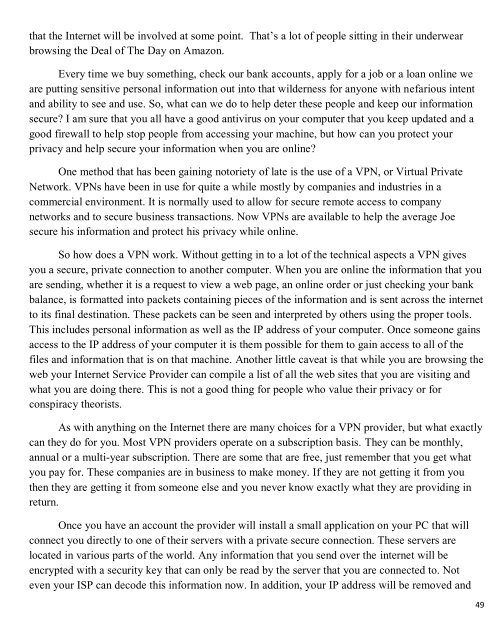ce magazine Anniversary 2019 issue
You also want an ePaper? Increase the reach of your titles
YUMPU automatically turns print PDFs into web optimized ePapers that Google loves.
that the Internet will be involved at some point. That‟s a lot of people sitting in their underwear<br />
browsing the Deal of The Day on Amazon.<br />
Every time we buy something, check our bank accounts, apply for a job or a loan online we<br />
are putting sensitive personal information out into that wilderness for anyone with nefarious intent<br />
and ability to see and use. So, what can we do to help deter these people and keep our information<br />
secure? I am sure that you all have a good antivirus on your computer that you keep updated and a<br />
good firewall to help stop people from ac<strong>ce</strong>ssing your machine, but how can you protect your<br />
privacy and help secure your information when you are online?<br />
One method that has been gaining notoriety of late is the use of a VPN, or Virtual Private<br />
Network. VPNs have been in use for quite a while mostly by companies and industries in a<br />
commercial environment. It is normally used to allow for secure remote ac<strong>ce</strong>ss to company<br />
networks and to secure business transactions. Now VPNs are available to help the average Joe<br />
secure his information and protect his privacy while online.<br />
So how does a VPN work. Without getting in to a lot of the technical aspects a VPN gives<br />
you a secure, private connection to another computer. When you are online the information that you<br />
are sending, whether it is a request to view a web page, an online order or just checking your bank<br />
balan<strong>ce</strong>, is formatted into packets containing pie<strong>ce</strong>s of the information and is sent across the internet<br />
to its final destination. These packets can be seen and interpreted by others using the proper tools.<br />
This includes personal information as well as the IP address of your computer. On<strong>ce</strong> someone gains<br />
ac<strong>ce</strong>ss to the IP address of your computer it is them possible for them to gain ac<strong>ce</strong>ss to all of the<br />
files and information that is on that machine. Another little caveat is that while you are browsing the<br />
web your Internet Servi<strong>ce</strong> Provider can compile a list of all the web sites that you are visiting and<br />
what you are doing there. This is not a good thing for people who value their privacy or for<br />
conspiracy theorists.<br />
As with anything on the Internet there are many choi<strong>ce</strong>s for a VPN provider, but what exactly<br />
can they do for you. Most VPN providers operate on a subscription basis. They can be monthly,<br />
annual or a multi-year subscription. There are some that are free, just remember that you get what<br />
you pay for. These companies are in business to make money. If they are not getting it from you<br />
then they are getting it from someone else and you never know exactly what they are providing in<br />
return.<br />
On<strong>ce</strong> you have an account the provider will install a small application on your PC that will<br />
connect you directly to one of their servers with a private secure connection. These servers are<br />
located in various parts of the world. Any information that you send over the internet will be<br />
encrypted with a security key that can only be read by the server that you are connected to. Not<br />
even your ISP can decode this information now. In addition, your IP address will be removed and<br />
49


















